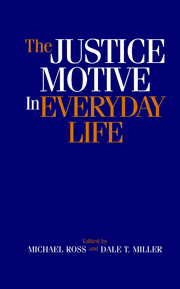Book contents
- Frontmatter
- Contents
- List of Contributors
- Introduction
- Theoretical Perspectives on the Justice Motive
- Victim Derogation and the Belief in a Just World
- The Justice Motive and Prosocial Behavior
- Justice-Based Reactions to Transgressors
- 16 Retributive Justive: Its Socical Context
- 17 Just Punishments: Research on Retributional Justice
- 18 Deservingness, Entitlement, and Reactions to Outcomes
- 19 Just World Processes in Demonizing
- Justice and Reaction to One's Own Fate
- Name Index
- Subject Index
16 - Retributive Justive: Its Socical Context
Published online by Cambridge University Press: 08 September 2009
- Frontmatter
- Contents
- List of Contributors
- Introduction
- Theoretical Perspectives on the Justice Motive
- Victim Derogation and the Belief in a Just World
- The Justice Motive and Prosocial Behavior
- Justice-Based Reactions to Transgressors
- 16 Retributive Justive: Its Socical Context
- 17 Just Punishments: Research on Retributional Justice
- 18 Deservingness, Entitlement, and Reactions to Outcomes
- 19 Just World Processes in Demonizing
- Justice and Reaction to One's Own Fate
- Name Index
- Subject Index
Summary
As for the social character of [penal] reaction, it comes from the social nature of the offended sentiments. Because they are found in all consciences, the infraction committed arouses in those who have evidence of it or who learn of its existence the same indignation. Everybody is attacked; consequently, everybody opposes the attack. Not only is the reaction general, but it is collective, which is not the same thing. It is not produced isolatedly in each one, but with a totality and a unity, nevertheless variable, according to the case.
Emile Durkheim, 1893/1964, p. 102Emile Durkheim, George Herbert Mead (1918), Thomas and Znaniecki (1945), and, in more recent times, Harold Garfinkel (1956) and Kai Erikson (1966) have commented extensively on the fact that deviant acts evoke group responses. In Erikson's summary phrasing:
The deviant act, then, creates a sense of mutuality among the people of a community by supplying a focus for group feeling. Like a war, a flood, or some other emergency, deviance makes people more alert to the interests they share in common and draws attention to those values which constitute the “collective conscience” of the community. (1966, p. 4)
Until relatively recently, social psychologists have given less attention to retributive justice than to other forms of justice, such as distributive and procedural justice (see Vidmar, 2000a).
- Type
- Chapter
- Information
- The Justice Motive in Everyday Life , pp. 291 - 313Publisher: Cambridge University PressPrint publication year: 2002
- 35
- Cited by



